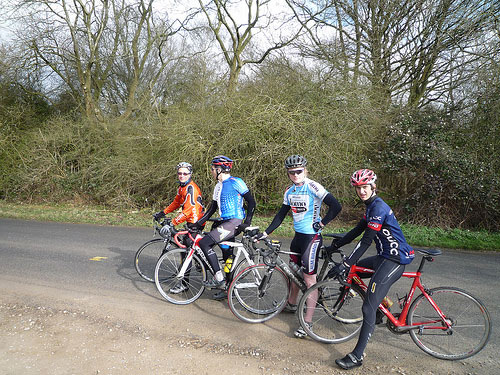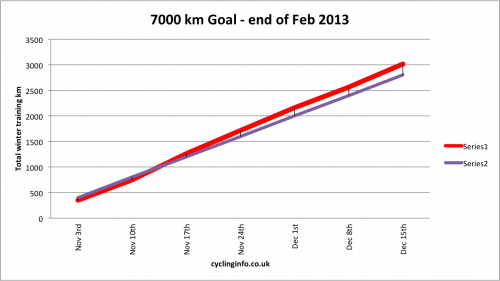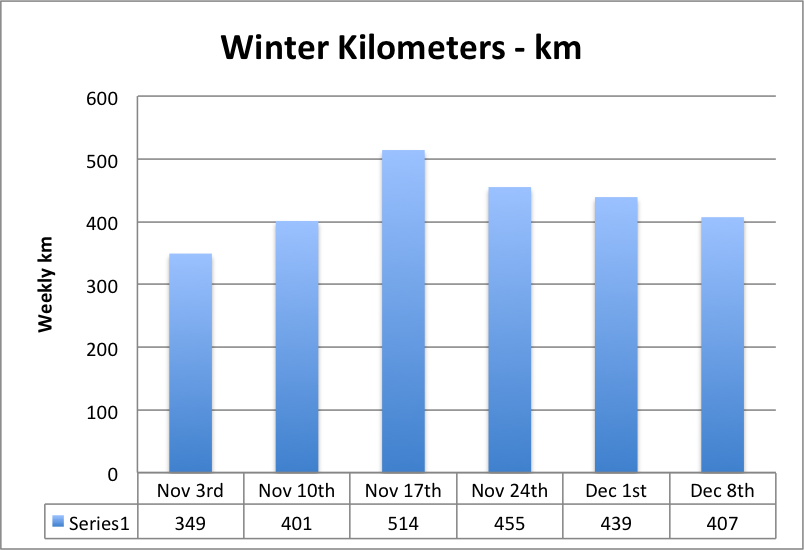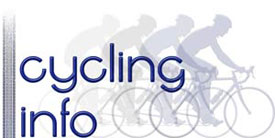Readers Question: I’ve noticed your winter training is all talking about “getting the miles in” including one week where you’d managed to get 125 km in on the rollers. I wanted to ask if you’d read Joe Friels latest blog post – Five Fundamentals of cycle training where he states:
“Performance is not dependent on how many miles or hours you do in a week – volume. Unfortunately, most athletes seem to think volume is the Holy Grail. For the experienced and serious athlete, in their order of importance, the keys to performance are
- race-like workout intensity,
- race-like workout duration
- weekly volume.
In fact, #3 is a distant third. I think the reason volume is so revered by athletes is that it’s easy to measure. Just add up the daily miles. Intensity, on the other hand, is hard to quantify.”
I’d love to hear your thoughts on that as a cyclist, compared to Friel who is not only a cyclist but a world class coach and well respected author.

Thanks for question. I read the blog post, and generally agreed with what he said. I also agree, that for athletes ‘race-like workout intensity’ becomes the most important factor in determining training gains. It’s also true that my current training / cycling is a lot about ‘getting the miles in’.
When I’m training for the hill climb season in September and October, the optimal training would involve considerably less miles than at the moment. In October, when I was aiming at peak race fitness, I may have done 600 km (33% of November total). I could probably have done even less miles. You feel what is important is the training intensity you do at that race-like intensity. Miles just slightly tire the legs out and don’t help you go faster.
For a 10 mile time trial, again miles are not so important. What is important is the training at that particular race intensity.
When Graeme Obree trained for the world hour record – his basic training was to ride as hard as he could for an hour! and then rest for a few days, and then go back and train as hard as he could for an hour! Chris Boardman also took this very specific kind of training to a new level when he became very good at time trials in the 1990s. He was doing less duration then most pros, but going even faster in time trials (three week tours were another matter)
Why Then Are Miles Still Important?
This is a good question for me, because racking up the miles over this winter, I am conscious of the fact it’s only making a fairly marginal difference to my race potential in 2013. Sometimes part of me is thinking - why spend another four hours in the cold December, when it’s really not that important?
There are a few factors:
- Well the weather is wonderful, and I’m quite enjoying cycling for the sake of cycling – not with any specific training target in mind.
- If I did this kind of mileage a few years ago, I would feel a lot more fatigued. At the moment, cycling 400 km a week doesn’t place much too much strain. I feel I’m recovering quite well, despite the miles being covered at a fairly high intensity.. I did a 100km on Mon, and on Tues went out and did 110km a bit harder because that’s what I felt like. Today, I just did one and half hours quite slow because I felt like taking it easy (plus it started to rain)
- I do plan to race 100 mile time trials and also the national 12 hour in 2013. So duration and quantity of miles is important for these targets. Although, I’m not sure whether I’m training for the 12 hour time trial or doing the 12 hour to justify the training!
- Training periods. The winter is a good time to really improve aerobic capacity and overall strength. For this training target, it is going to be lower intensity and higher duration than later in the season.
- My theory is that a lot of duration at this time of the year, really doesn’t make you much faster. But, it does make that race-like intensity training, later in the year, more effective. In others words, if you are used to cycling 2,000km a month, interval training will be more effective later in the year. When I increase the intensity later in the year, I will probably cut back on the miles.
- I really am not a fan of slow miles. When I go out for a four or five hour ride, I’m still looking to stretch the aerobic capacity and cycle at a fair lick – 70-80% of max heart rate, plus some hills where you can go even higher.
- Even in winter, I’m doing some higher intensity training. Definitely not as much as racing season, but if I feel recovered I’ll give it a go.
- I know miles are not that important, but, there is still something psychologically satisfying at having some easily identifiable target. Basically, I know miles aren’t important. But, it still gives me joy to produce mileage charts! That’s probably why I don’t have a coach. He would be saying why are you doing all these miles?
- Why are professionals better than amateurs? One reason, is that they cycle a lot more. It’s good to train for two hours a week, at your race intensity, but if you can train for four hours at race intensity, it’s even better. It’s good to train for 10 hours, but if you’re body can take it and you train for 15-20 hours of quality training, it will be even better. Bradley Wiggins was the world’s best time triallist in 2013. He did a lot of miles – a lot of six hour rides with race intensity within them. Most cyclists couldn’t cope with anything like his training load. Even B.Wiggins probably couldn’t have coped with his current training load a few years ago. But, if you want to be the best cyclist in the world, I don’t think you can do it on four hours training a week.
- Re: rollers. I give myself 32 km for an hour on the rollers, though I actually probably cover more. Prize to anyone who works out distance of cycling – 53*14 at 90 rpm for 60 minutes. Here there is also marginal improvements through bike handling, upper body strength, capacity to spin.
- I’ve never done this kind of winter training before. It will be interesting to see if it makes any difference in 2013.
Summary
- If you’re a time pressed cyclist, you can still be very competitive in short distance races, by training very specifically for short distance races. If you want to make the biggest improvements in the shortest time – sacrifice the low intensity miles, put more effort into the race intensity training.
- Don’t be intimidated by cycle bloggers who show off how many winter miles they’ve done, even producing very sad graphs to show their mileage accumulation, it doesn’t mean much. Remember, there’s no prizes for sprinting for that road side in January.
- It is quite possible, that doing miles for the sake of it, can compromise your optimal training effect. This depends on being able to notice if you are over-training or not.
- Over the years, you may be able to increase both the intensity and duration of training.
- As Joe Friel says for beginners, they shouldn’t worry about intensity because even low intensity cycling will see big performance gains.
Miles don’t matter, but you can still produce graphs!

- series 1 – actual
- series 2 – target

Related

26.68 miles cycled (42.9 km) on the rollers in an hour with 53*14 and 90 rpm. You’re short-changing yourself on miles there. Although there’s a lot less resistance of course.
Another great article Tejvan, always interesting to read.
Cheers Stuart. You win a free festive mince pie, courtesy of cyclinginfo!
I wonder whether someone who can ride steadily for four hours is likely to tire less over the course of an hour than someone who only ever cycles for an hour and no longer.
I do appreciate the principle behind Graeme Obree’s method, but for someone like me, who isn’t an elite athlete, I get more out of a short training ride if I’m comfortable with longer distances. It means I have more left in the tank for the last hill of the day and can therefore climb it at a higher intensity.
Yes, I agree. That’s what I feel too.